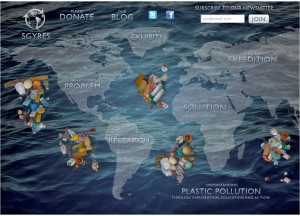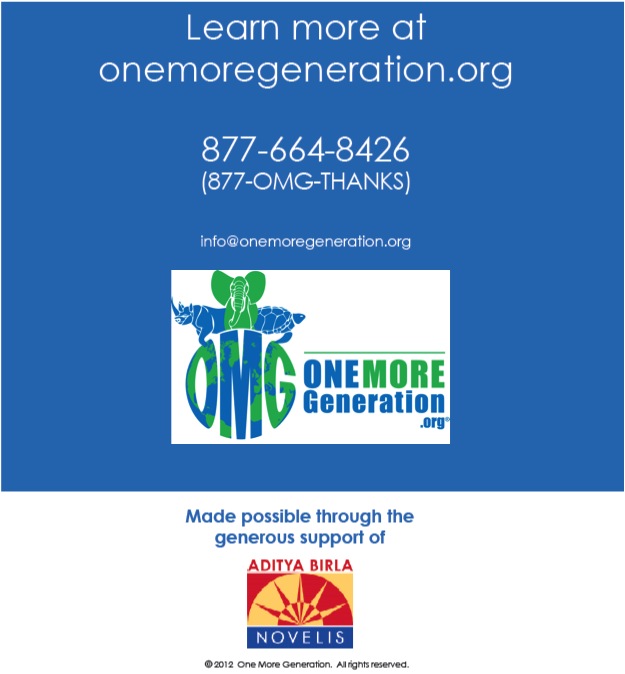Plastic and Recycling Awareness Curriculum Overview
Welcome to the One More Generation Plastic and Recycling Awareness Week program. One More Generation is a nonprofit 501(c)(3) organization dedicated to the preservation of endangered species and our environment.
Bring the Plastic and Recycling Curriculum to Your School
 One More Generation aims to ensure that all endangered species survive at least One More Generation . . . and beyond. This program is developed to further educate students about the impacts of plastic, plastic pollution, and recycling.
One More Generation aims to ensure that all endangered species survive at least One More Generation . . . and beyond. This program is developed to further educate students about the impacts of plastic, plastic pollution, and recycling.
As explained throughout this Teacher’s Guide, 21st Century Skills are strongly embedded in each session through problem solving, innovation, critical thinking and contextual learning. Media is discussed and analyzed and students communicate their thoughts with each other after each instructional session. The Curriculum content is engaging for all learners through active learning strategies, and there are specific opportunities for students to take action based on their new knowledge.
Introduction to the Teacher’s Guide
One More Generation has developed this Teacher’s Guide to accompany our Plastic and Recycling Awareness Week program through the generous support of Novelis 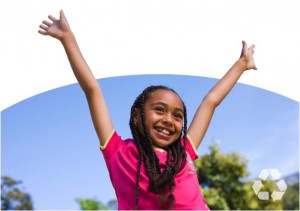
This program can be used with children ages 5 to 12, particularly in schools, as well as organizations such as Boys & Girls Clubs, Boy and Girl Scouts, or as part of other community organizations or church groups. This Teacher’s Guide is intended to provide you with an overview of the entire Plastic and Recycling Awareness Week, as well as detailed lesson plans for each 45 minute segment of the 5 days program.
.
Check out this video which features our curriculum from our friends at HooplaHa:
Program Overview
Learning Objectives
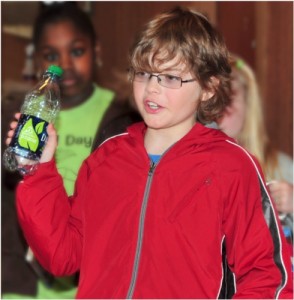 • Students will gain a greater understanding of the need to carefully use all resources in ways that are not wasteful and damaging to the environment —both now and in the future.
• Students will gain a greater understanding of the need to carefully use all resources in ways that are not wasteful and damaging to the environment —both now and in the future.
• Students will gain a greater understanding of the threats facing a variety of organisms, including endangered species, and the need to reduce plastic pollution and aluminum waste.
• Students will understand that they can personally play an important role in reducing plastic pollution and increasing recycling rates for a healthier environment.
• Students will gain a greater understanding of the different types of plastics, and which can and cannot be recycled.
• Students will learn more about different states of matter and how plastic and aluminum can be changed into different states and reformed during the recycling process.
• Students will learn that aluminum beverage cans and certain plastics are excellent examples of closed-loop recycling and learn how recycling cans can save energy and reduce greenhouse gas emissions.
• Students will understand that recycling involves a firsthand commitment to making the environment healthier.
Subject Areas: Science, Art, and English Language Arts
Grade Level: K-6 (Ages 5-12)
Time: Five 60-minute periods on successive days
Learning Standards Met By Program
Next Generation Science Standards
Organisms and Their Environments
• Use observations to describe how plants and animals depend on the air, land, and water where they live to meet their needs, and they in turn, can change their environment.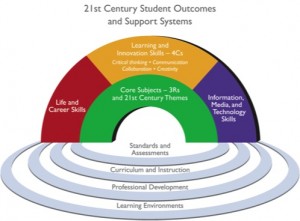 (Days 1, 2)
(Days 1, 2)
• Provide evidence that humans’ uses of natural resources can affect the world around them, and share solutions that reduce human impact. (Days 1, 2, 3, 4, 5)
Environmental Impacts on Organisms
• Use models to evaluate how environmental changes in a habitat affect the number and types of organisms that live there; some remain, move in, move out, and/or die. (Day 2)
• Use evidence to argue that some changes in an organism’s habitat can be beneficial or harmful to the organism. (Days 2, 5)
Structure and Properties of Matter
• Make observations that matter exists as different materials, which can be described and classified by their observable properties and their uses. (Days 3, 4)
• Compare and share observations of solids and liquids at room temperature.
(Day 4)
• Ask questions and share information about the natural materials from which human-made products are built. (Days 1, 2, 4)
Common Core State Standards for English Language Arts
College and Career Readiness Anchor Standards for Writing
• Produce clear and coherent writing in which the development, organization, and style are appropriate to task, purpose, and audience. (Day 3, Adaptations/Extensions on other days)
• Develop and strengthen writing as needed by planning, revising, editing, rewriting, or trying a new approach. (Day 3, Adaptations/Extensions on other days)
Plastic and Recycling Awareness Week Classroom Kit Contents:
Each Teacher Receives
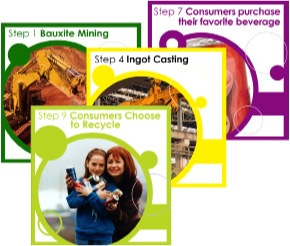 • Teacher’s Guide with 5 lesson plans for each day of the program
• Teacher’s Guide with 5 lesson plans for each day of the program
• Age-appropriate environmental book(s) for the classroom
• Set of 10 “Effects of Plastic Pollution” discussion posters
• Set of 10 “Aluminum Can Manufacturing Steps” posters
• “Life Cycle of the Aluminum Can” recycling poster
• Plastic pollution fact sheet
• Reusable water bottle (optional)
• Large reusable shopping bag (optional)
• Large recycle symbol poster
• Two-sided What Do Those Recycle Numbers Mean, Anyway? fact sheet
• Set of glass reusable drinking straws as give-a-ways for students
Each School Receives
• DVD: Bag It: Is your life too plastic?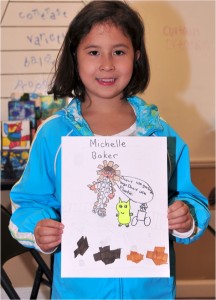
• DVD: What’s One Can?
• Aluminum/stainless steel water bottle for each child participating in the program (optional), handed out on Day 1 of the program.
• Reusable shopping bag (optional) for each child participating in the program. The bags are decorated on Day 2 of the program.
• Large canvas on which to paint a mural (8′ x 16′)
• OMG Access Code Cards for each child and teacher participating in the program
• Letter to parents to be copied and sent home or emailed to all families
• Sample press release
Each School Granted Access to OMG Resource Center
(www.onemoregeneration.org)
• OMG Introductory Video (to be played for all students on Day 1)
• Certificate of Completion (accessible from the OMG website via a special OMG Access Code)
• 10 Ways to Reduce Plastic In Your Home fact sheet
• Informative environmental videos and support materials to help families and teachers continue the education
Day 1 – Introduction to Plastic and Recycling Awareness
Lesson Overview
 In this lesson, students will be introduced to One More Generation and the mission of its founders, Carter and Olivia Ries, to ensure that each endangered species survives for at least one more generation. Starting on day one of the
In this lesson, students will be introduced to One More Generation and the mission of its founders, Carter and Olivia Ries, to ensure that each endangered species survives for at least one more generation. Starting on day one of the
Plastic and Recycling Awareness Week, students will learn about plastic pollution and recycling, and the ways they can personally make a difference to help the environment.
Lesson Objectives
• Students will gain a greater understanding of the threats facing a variety of organisms, including endangered species, and the need to reduce plastic pollution and to always recycle aluminum.
• Students will understand that they can personally play an important role in reducing plastic pollution and increasing recycling rates for a healthier environment.
Subject Area: Science
Grade Level: K-6 (Ages 5-12)
Time: 60 minutes
Next Generation Science Standard
Organisms and Their Environments
• Provide evidence that humans’ uses of natural resources can affect the world around them, and share solutions that reduce human impact.
Day 2 – Plastic Pollution: Effects and Solutions
Standards require that students understand the needs of organisms and their relationships with the environment. This lesson uses powerful photographic imagery to help students develop an understanding of how plastic pollution affects the ability of organisms to meet their needs and survive. Optional: Students discuss ways to reduce plastic pollution and create their own reusable cloth shopping bags with artistic educational messaging to spread the word about the need to reduce plastic pollution.
Lesson Objectives
• Students will understand the effects of plastic pollution on living organisms.
• Students will be more aware of simple changes each one of us can incorporate into our daily lives which will have an immediate impact on our environment.
• Students will think critically about their role in reducing plastic pollution and be motivated to take responsible action to reduce the problem.
Subject Areas: Science and Art
Grade Level: K-6 (Ages 5-12)
Time: 60 minutes
Next Generation Science Standards
Organisms and Their Environments
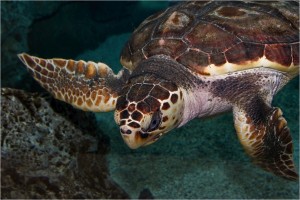 • Use observations to describe how plants and animals depend on the air, land, and water where they live to meet their needs, and they in turn, can change their environment.
• Use observations to describe how plants and animals depend on the air, land, and water where they live to meet their needs, and they in turn, can change their environment.
• Provide evidence that humans’ uses of natural resources can affect the world around them, and share solutions that reduce human impact.
Environmental Impacts on Organisms
• Use models to evaluate how environmental changes in a habitat affect the number and types of organisms that live there; some remain, move in, move out, and/or die.
• Use evidence to argue that some changes in an organism’s habitat can be beneficial or harmful to the organism.
Day 3 – What Do Those Recycling Numbers Mean?
Lesson Overview
In this lesson, students will learn more about plastics and what the different numbers stamped on them mean. They will learn which are considered safe for recycling and for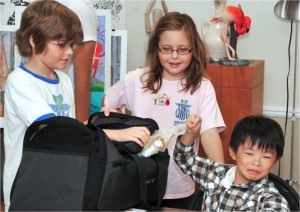 the environment, in general. Then they will write a poem—as a class or individually—which helps them to remember what they learned.
the environment, in general. Then they will write a poem—as a class or individually—which helps them to remember what they learned.
Lesson Objectives
• Students will gain a greater understanding of the different types of plastics, which plastics are considered safe for recycling, and which types are typically not accepted by community recycling centers.
• Students will learn more about different types of matter and how plastic can be changed into different states and reformed during the recycling process.
• Students will learn more about the writing process and writing poetry.
Subject Area: Science and English Language Arts
Grade Level: K-6 (Ages 5-12)
Time: 60 minutes
Next Generation Science Standards
Structure and Properties of Matter
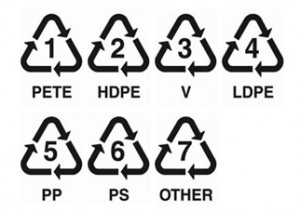 • Make observations that matter exists as different materials, which can be described and classified by their observable properties and their uses.
• Make observations that matter exists as different materials, which can be described and classified by their observable properties and their uses.
Organisms and Their Environments
• Provide evidence that humans’ uses of natural resources can affect the world around them, and share solutions that reduce human impact.
Common Core State Standards for English Language Arts
College and Career Readiness Anchor Standards for Writing
Standard 4. Produce clear and coherent writing in which the development, organization, and style are appropriate to task, purpose, and audience.
Standard 5. Develop and strengthen writing as needed by planning, revising, editing, rewriting, or trying a new approach.
Day 4 – The Power of Aluminum Recycling
Lesson Overview
In this lesson, students will learn about the importance of recycling, with a focus on aluminum can recycling as an example. The steps in the process of aluminum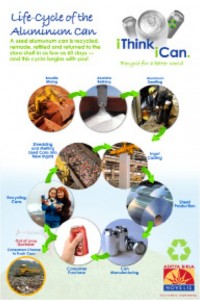 manufacturing and recycling are discussed, including how aluminum can be continuously recycled through “closed-loop recycling.” A variety of interesting statistics are shared, including how much energy can be saved or lost by the students’ actions. Optionally, the lesson closes by taking action to collect trash outside and recycle as much of it as possible. Adaptations/extensions are listed at the end of the lesson, which include additional activities and ideas for how to tailor the lesson to meet the needs of different learners.
manufacturing and recycling are discussed, including how aluminum can be continuously recycled through “closed-loop recycling.” A variety of interesting statistics are shared, including how much energy can be saved or lost by the students’ actions. Optionally, the lesson closes by taking action to collect trash outside and recycle as much of it as possible. Adaptations/extensions are listed at the end of the lesson, which include additional activities and ideas for how to tailor the lesson to meet the needs of different learners.
Lesson Objectives
• Students will gain a greater understanding of the need to carefully use all resources in ways that are not wasteful and damaging to the environment — both now and in the future.
• Students will learn that aluminum beverage cans are an excellent example of closed-loop recycling and learn how recycling cans saves energy and reduce greenhouse gas emissions.
• Students will understand that recycling involves a firsthand commitment to making the environment healthier.
Subject Area: Science
Grade Level: K-6 (Ages 5-12)
Time: 60 minutes
Next Generation Science Standards
Structure and Properties of Matter
• Make observations that matter exists as different materials, which can be described and classified by their observable properties and their uses.
• Compare and share observations of solids and liquids at room temperature.
• Ask questions and share information about the natural materials from which human-made products are built.
Organisms and Their Environments
• Provide evidence that humans’ uses of natural resources can affect the world around them, and share solutions that reduce human impact.
Day 5 – Plastic Trash Sculpture or Mural
Lesson Overview
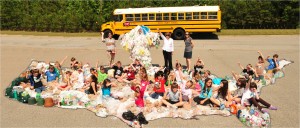 This lesson is designed to allow the students to enjoy working together as a class and celebrate what they learned throughout the week. In the process, concepts such as the need for recycling and protecting the environment for living organisms will be reinforced and acted upon.
This lesson is designed to allow the students to enjoy working together as a class and celebrate what they learned throughout the week. In the process, concepts such as the need for recycling and protecting the environment for living organisms will be reinforced and acted upon.
Lesson Objectives
• Students will demonstrate their understanding of the effects of plastic pollution and aluminum on living organisms.
• Students will demonstrate their understanding that simple changes each one of us can incorporate into our daily lives can have an immediate impact on our environment.
• Students will demonstrate that they understand their role in reducing plastic pollution and recycling aluminum increases their motivation to take responsible action to reduce the problem.
Subject Areas: Science and Art
Grade Level: K-6 (Ages 5-12)
Time: 60 minutes
Next Generation Science Standards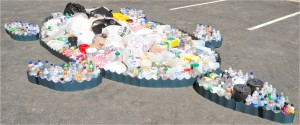
Organisms and Their Environments
• Provide evidence that humans’ uses of natural resources can affect the world around them, and share solutions that reduce human impact.
Environmental Impacts on Organisms
• Use evidence to argue that some changes in an organism’s habitat can be beneficial or harmful to the organism.
Adaptations/Extensions
• Invite members of the school community and/or broader community to view the sculpture. Encourage students to share what they learned throughout the week with the visitors.
• Take photos of the sculpture and day’s events and share them on your school website, social media, etc. Encourage everyone to continue to spread the word about plastic and recycling.
• Have students research the percentage of the world’s population comprised of those from the United States and the percentage of the world’s energy that the U.S consumes. They will learn that although we Americans represent only about five percent of the world’s population, we consume roughly 20 percent of its energy. Remind students that one action we can take for a better world is to use less energy and recycle.
• Write a class pledge to help the environment, incorporating ideas that were learned and expressed by the students throughout the week. Share the pledge with other classrooms. Have students vote school-wide for the best pledge, which can then be adopted by the whole school.
• Have students prepare a letter to local city council members, the mayor, and/ or other community officials, asking for a meeting to discuss the impact of plastic waste on your community and possible alternatives to lessen this impact, including increased recycling. Have students and staff sign the letter.
Conclusion
Providing students with an academic forum to critically discuss and solve environmental issues allows for 21st Century Skills to be applied in an authentic and meaningful way. Students will learn firsthand from their peers how they are affecting their world and how they can be part of the solutions for present challenges as well as the ones they have yet to face. On a larger scale, when student voices work together to increase awareness in the community opportunities arise for the thinking of our youth to be heard and valued.
If these ideals are goals for your learning environment, implementing a successful Plastic and Recycling Awareness Week with your students may be your first step in the right direction
Funding Requirements
The cost for the entire weeklong curriculum including all provided materials and teacher guides ranges from about $10.00 to $16.00 per students depending on the support materials desired for the program. The full program includes an aluminum reusable water bottle
References
BBC News. “Planet Earth’s New Nemesis.” BBC News. BBC, 8 May 2002. Web. 29 Aug. 2012. <http://news.bbc.co.uk/2/hi/uk_news/1974750.stm>.
Common Core State Standards for English Language Arts. 2011. National Governors Association Center for Best Practices and Council of Chief State School Officers. All rights reserved. 29 Aug. 2012. Learn more online at <http://www.corestandards.org>.
Daily Mail Reporter. “The Life Cycle of a Plastic Bag.” Daily Mail. 27 Feb. 2008. Web. 29 Aug. 2012. <http://www.dailymail.co.uk/money/bills/article-1620912/The-lifecycle-of-a-plastic-bag.html>.
Doucette, Kitt. “The Plastic Bag Wars.” Rolling Stone. Rolling Stone Mag., 4 Aug. 2011. Web. 29 Aug. 2012. <http://www.rollingstone.com/politics/news/the-plastic-bagwars-
20110725>.
EarthTalk. “‘Dead’ Sea Of Plastic Bottles.” Scientific American. Scientific American Mag., 23 Oct. 2008. Web. 29 Aug. 2012. <http://www.scientificamerican.com/article.
cfm?id=dead-sea-of-plastic-bottles>.
Gaskill, Melissa. “Trawls and Trash Represent One-Two Punch for Threatened Turtles.”
Scientific American. Scientific American Mag., 15 Jul. 2011. Web. 29 Aug. 2012. <http://www.scientificamerican.com/article.cfm?id=trawls-and-trash-representthreats-for-sea-turtles>
Next Generation Science Standards Public Draft. 2012. National Research Council et al. 29 Aug. 2012. Learn more online at <http://www.nextgenscience.org>.
Partnership for 21st Century Skills. Framework for 21st Century Learning. P21, n.d. Web. 29 Aug. 2012. Learn more online at <www.p21.org>.
“Population and Energy Consumption.” World Population Balance. 2012. Web. 29
Aug. 2012. <http://www.worldpopulationbalance.org/population_energy>. Roach, John. “Are Plastic Grocery Bags Sacking the Environment?” National Geographic News. National Geographic Newspaper, 2 Sept. 2003. Web. 29
Aug. 2012. <http://news.nationalgeographic.com/news/2003/09/0902_030902_ plasticbags.html>. The Story of Stuff Project. Bottled Water Myth Versus Reality. Download. The Story of Stuff. n.d. Web. 29 Aug. 2012. <http://www.storyofstuff.org/sos_downloads/PDF
For More information
To learn more on how you can get our Plastic and Recycling Awareness Week program in your school or community organization, give us a call or send us an email and we will gladly help you with all the details.

